KTH Energy Platform hosts French-Swedish research days on the theme of the future of nuclear energy
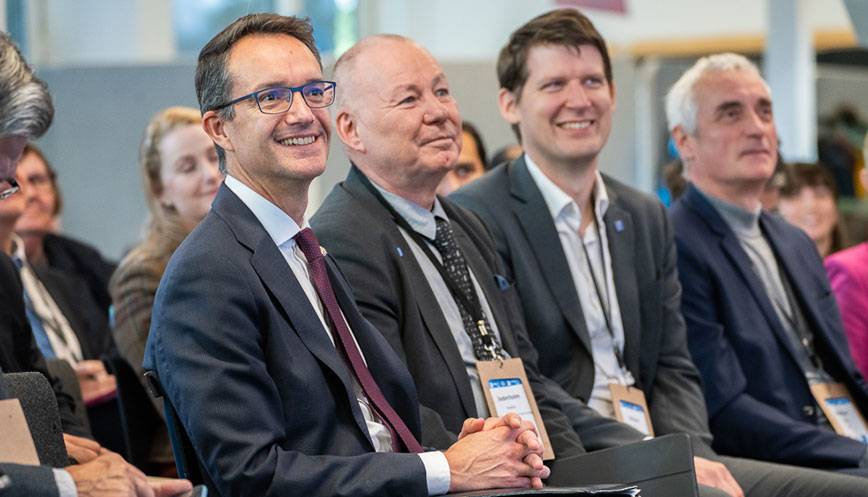
This year’s French-Swedish research days focused on the theme of the future of nuclear energy, with KTH Energy Platform hosting the two-day conference. The event was opened by the French ambassador to Sweden, Etienne de Gonneville, and KTH Vice Chancellor Anders Söderholm. There then followed two days packed with knowledge for the attending French and Swedish researchers and invited industry representatives.
This was the 26th edition of the French-Swedish research days, held this year on October 9th and 10th and hosted by KTH Energy Platform. It was held in collaboration with the French Institute in Sweden, the Embassy of France in Sweden, the French Alternative Energies and Atomic Energy Commission (CEA), and KTH.
The first day was opened by KTH Vice Chancellor Anders Söderholm and the French ambassador, Etienne de Gonneville.
“The topic of today’s discussions is extremely current. Nuclear power is expected to become an even more important component in the fossil-free energy system of the future. Several policy initiatives are being taken to pave the way for future investment in the nuclear technology of tomorrow,” Söderholm said.
He went on to highlight the importance of KTH offering Sweden’s only Master’s programme in Nuclear Energy Engineering and growing research in the field. This is set to be significant, especially given the growing need for skilled people in this field.
“In a world of rapid social change, we need more collaboration across disciplines and national borders. So, we look forward to further strengthening collaboration with French universities and researchers to build a sustainable future together.”
Ambassador de Gonneville spoke about the close co-operation planned between France and Sweden on the development of nuclear power.
“We’ll strengthen our co-operation, especially in nuclear safety and licensing, competence, financing, safety and research. And create a framework for future exchange,” de Gonneville said.
He also emphasised the importance of the French-Swedish Innovation Partnership which is a strategic partnership for innovation, digital transformation and green solutions.
“Now we need to work together to tackle the technical, research-based and societal challenges that stem from the lofty ambitions linked to nuclear power, as well as the associated competence-related challenges. And I hope that this two-day conference will help by giving different actors the opportunity to get to know each other better and build networks to take our French-Swedish community forward,” he said.
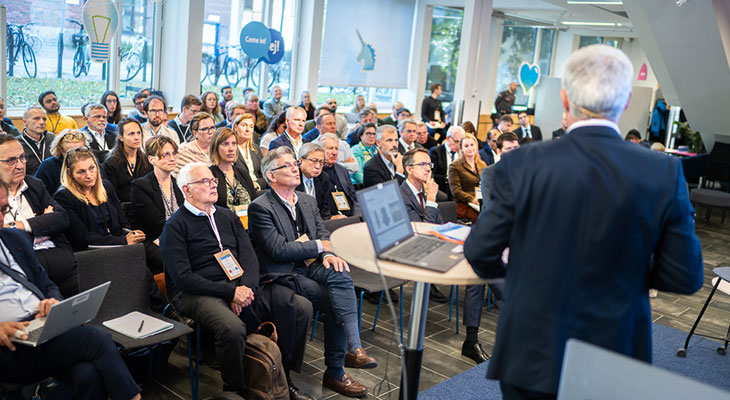
New SMR knowledge
The first session of the day - ‘Construction of New Nuclear Reactors’ - started with a presentation from the ANItA research centre by KTH’s professor Mats Jonsson. The centre, otherwise known as the Academic-Industrial Nuclear Technology Initiative for Achieving a Future Sustainable Energy Supply, aims to create a knowledge and competence base for new nuclear technologies for decision makers. ANItA projects started in 2023 and focus on various aspects of SMR technology (small modular reactors).
The centre is managed by Uppsala University with both KTH and Chalmers as partners.
Then, Olivier Godon, EDF Engineering & New Nuclear Division, spoke about the technology and development of the EPR2 reactor and Nuward. The EPR technology is based on more than 60 years’ experience of the development and operation of nuclear reactors in France and elsewhere. France recently decided to build six more nuclear reactors with EPR technology, with an option for a further eight.
“At the same time, the development of Nuward SMR technology continues, primarily focused on the European market,” Godon said.
Godon and Jonsson then answered questions from participants on everything from the planning horizon for SMR reactors, to waste management and the expected lifespan of new reactors.
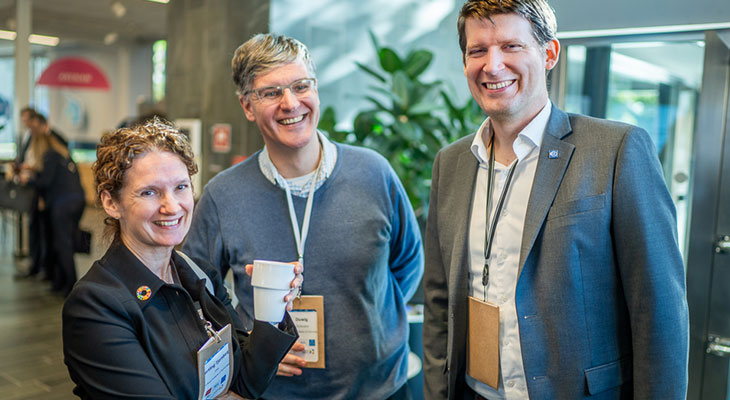
Extended time horizons
After a brief coffee break, it was time for the next session: ‘Extending the life of nuclear power plants/ageing of infrastructures’, which was opened by two industry representatives, Martin Luthander, Vattenfall, and Udo Wildner, from French company Framatome.
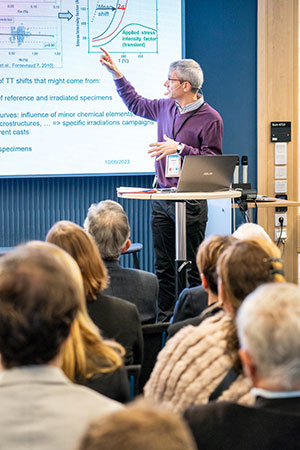
Luthander explained that Vattenfall’s planning horizon stretches up to 80 years ahead, which requires an extremely holistic view of everything from technology to business issues. Before the end of this year, the company must announce its plans to build new nuclear power stations in Sweden.
Wildner also stressed Vattenfall’s long-term approach in terms of investment in nuclear energy. He highlighted the need to extend the life of the majority of its reactors as a way to address the climate crisis. This will require a great deal of work because each facility is unique and demands particular steps in terms of replacing specific technology and components.
Ludovic Vincent, from CEA, then provided technical insights into research being conducted into the ageing of various materials in today’s nuclear power plants. He emphasised opportunities for increasing knowledge by using materials from nuclear power plants that are currently decommissioned and being dismantled.
The next speaker was Per Seltborg, Research Director at the Swedish Radiation Safety Authority, who spoke about the agency’s work and areas of responsibility. He particularly highlighted the need for a national strategy to increase competence in the field given the planned investments being made in Swedish nuclear energy.
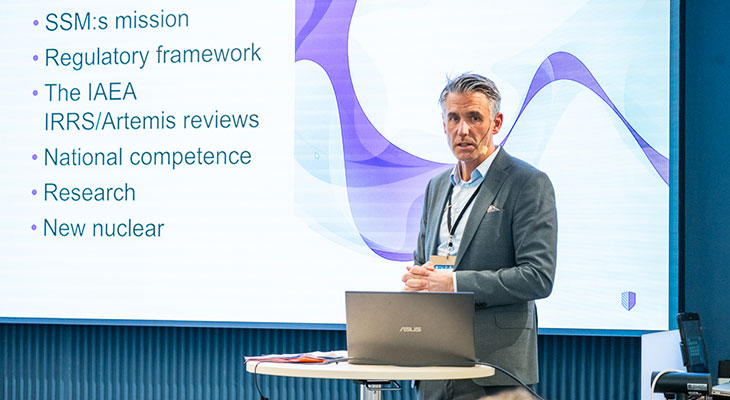
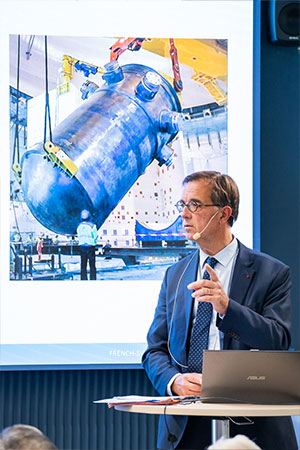
Jean-Christophe Niel, Director General of France’s equivalent agency, the Institut français de radioprotection et de sûreté nucléaire (IRSN). Niel shared some of the technical challenges of extending the lifespan of French reactors. Niel also raised the possibilities of a stronger digitization of the nuclear energy sector, including in the form of so-called digital twins.
Panel discussion focused on skills shortage
At the end of day one, there was a roundtable discussion about the need for competence to support the future of nuclear energy. The stage was shared by Karen Daifuku, Executive Director of I2EN, Hervé Maillart, permanent delegate of the Nuclear Industry Strategic Committee (CSFN), Elina Charatsidou, doctoral student at KTH, and Jan Dufek, a lecturer at KTH. The panel was moderated by Valérie Lemarquand, Scientific Attaché at the French Embassy.
Daifuku began by giving an overview of I2EN’s work to establish programmes and training to address the considerable need for skills. A need that is so great that it is becoming difficult to recruit sufficient numbers of teachers and fill training places. At the same time, it welcomes students from all over the world as most of the courses are given in English.
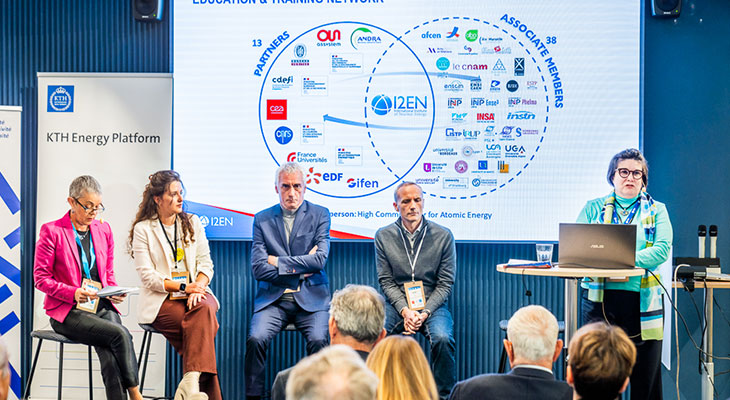
Maillart stressed that the skills shortage is a global problem where in France alone tens of thousands of additional people are needed per year until the year 2025. He said that the training resources exist, but that there is currently insufficient interest; which is why the EU is being called upon to broaden future skills initiatives to include the whole of Europe.
Charatsidou has a very popular YouTube channel with more than 70,000 followers where she explains nuclear technology and the development of new nuclear reactors. She emphasised the importance of being visible outside academia and industry to attract more people to the sector. And the importance of addressing the right age groups in order to influence their choice of career path early at an early stage.
Daifuku highlighted the need for good planning of new skills investments to fill the right needs at the right time, as well as improving skills at all levels, where the need is greatest among tomorrow’s operators and technicians.
Dufek spoke about KTH’s Master’s programme in Nuclear Energy Engineering, which currently has a record number of students but is limited by the availability of teaching premises. Pär Olsson, Professor and Co-ordinator of the Sunrise research centre, also contributed to the discussion, with an appeal to the government for more long-term funding of the country’s universities in research and education in nuclear energy.
The day ended with a reception at the Embassy of France.
”With this event, we succeeded in bringing together French and Swedish researchers, academics, along with representatives from the industry and public bodies. This success shows that there is a strong will to work together on topics relating to nuclear energy. The discussions that took place during the two-day conference paved the way for further actions between French and Swedish partners.” says Valérie Lemarquand, Scientific Attaché at the French Embassy.
The Franco-Swedish Research Days attracted more than 120 participants from Sweden and France.
”We do not have much time to act decisively and should accelerate decarbonation. We can certainly do something alone but we should do more and faster together. Today, we gather experts, authorities and industries from both Sweden and France and they all want to work together and move forward on this journey. It feels comforting to see so many people here investing in friendship and collaboration.” says Christophe Duwig, Deputy Director of KTH’s Energy Platform.
The conducted two-day programme
Text: Magnus Trogen Pahlén
